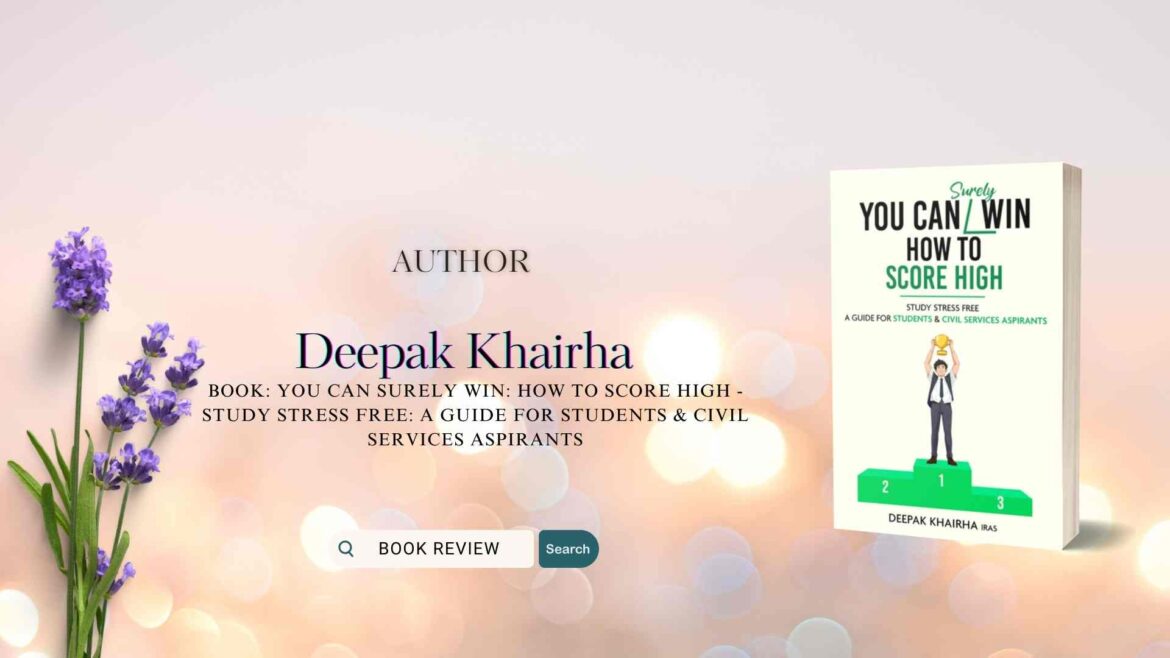“You Can Surely Win: How to Score High – Study Stress Free” by Deepak Khairha is a compassionate and well-thought-out guide aimed at addressing the growing mental health crisis among students, particularly those preparing for competitive exams like Medical, Engineering, and Civil Services. With an alarming number of student suicides reported each year, especially in pressure-cooker cities like Kota, Khairha’s work comes as both a timely and essential resource, offering practical advice and emotional support to students and their parents alike.
The book’s central mission is to prevent students from succumbing to depression or suicidal thoughts during their high-pressure academic journeys. Khairha, having witnessed the struggles of students up close during his tenure in Kota, a city synonymous with coaching centers, writes with a clear understanding of the emotional toll such environments can impose. Drawing from his own experiences, including his failures and eventual success, he offers actionable strategies that not only aim to improve academic performance but also focus on emotional well-being and resilience.
The book is divided into five sections targeting different audiences: younger students (6th to 8th grades), high school students (9th to 12th grades), aspirants of competitive exams, civil service hopefuls, and parents of all these groups. This structure makes the book versatile and relevant to a broad spectrum of readers. Each section is filled with practical advice on a range of subjects—from time management, goal setting, and study techniques to handling failure and coping with stress. Khairha does not just focus on the academic side of preparation but also emphasizes lifestyle changes, mental health, and self-care as critical components of success.
The guidance on time management is particularly useful, with the author emphasizing the importance of planning, breaking tasks into manageable chunks, and staying disciplined. His suggestion to adopt a positive mindset and transform setbacks into learning opportunities is a recurring theme throughout the book. Khairha encourages students to embrace challenges and see failures not as a reflection of their self-worth, but as stepping stones to success.
What truly sets this book apart is its focus on mental health. The author openly addresses the emotional turmoil that accompanies exam preparation and provides specific tips on how to manage stress. From suggesting techniques like mindfulness and meditation to creating a supportive environment at home, Khairha offers a comprehensive approach to student well-being. He advocates for open communication between parents and children, highlighting the crucial role parents play in supporting their children’s mental health during these demanding years.
Khairha’s personal connection to the subject matter adds an emotional depth to the book. His journey, from facing personal failures to becoming a respected officer in the Indian Railway Accounts Service, serves as an inspirational backdrop for his message. His mission is clear: to help students embrace life with resilience and hope, rather than succumb to feelings of defeat.
The writing itself is accessible and straightforward, making complex concepts easy to understand for students and parents alike. The advice is practical and not overly theoretical, which is important given the nature of the book’s target audience—students who are already overwhelmed with academic pressures. The tone of the book is supportive and empathetic, rather than authoritative, which aligns well with its purpose of providing emotional and psychological guidance alongside academic tips.
In conclusion, “You Can Surely Win: How to Score High” is more than just a study guide—it is a heartfelt manual for students navigating the treacherous waters of academic pressure. Deepak Khairha’s efforts to combine practical academic strategies with emotional well-being advice make this book a must-read for students facing high-stakes exams, as well as for parents who want to support their children in these challenging times. The author’s ultimate goal of eliminating student suicides and fostering hope and resilience is one that should be supported by all. The book is an invaluable resource for creating a balanced, successful approach to both exams and life.



